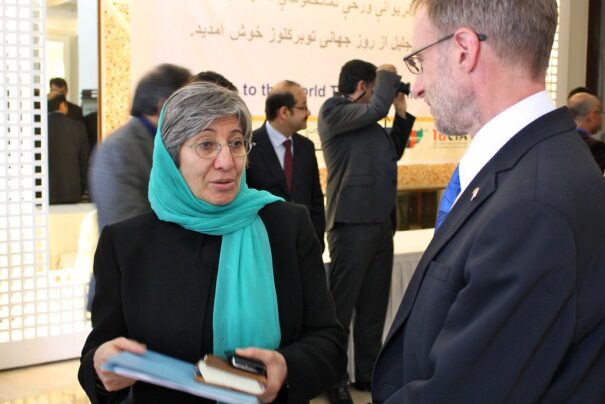
Photo by Canada in Afghanistan / Canada en Afghanistan
This article is adapted from an opinion piece by Dr. Sima Samar, originally published in Ms. Magazine.
Dr. Sima Samar is a human rights advocate and medical doctor who belongs to Afghanistan’s ethnic Hazara minority group. Dr. Samar served as Minister of Women’s Affairs from 2001 to 2003 and was the highest ranking woman in Afghanistan, serving as Vice President of the post-Taliban Interim Administration of Afghanistan. She was also Chairperson of Afghanistan Independent Human Rights Commission for 17 years, witnessing firsthand the factors that led to the recent reversal of fortunes in Afghanistan. According to Dr. Samar, Afghanistan has been a collective failure of the Afghan people, government, the international community and UN agencies and they all hold a collective responsibility to reverse the current course.
Writing about the Taliban takeover of Afghanistan twenty years after they were removed from power is both surreal and heartbreaking for Dr. Samar. The Taliban that now rules Afghanistan is the same extremist entity that revoked the basic human rights of Afghanistan’s women and girls and minorities when they were first in power from 1996 to 2001 and have swiftly reinstated gender apartheid.
“I did not think that I would see history repeating itself in my country twice within my life,” writes Samar.
She asks “how did Afghanistan change from a country where I attended co-educational schools, walked freely and was not required to wear a scarf on my head or burqa even in the conservative province of Helmand, where I grew up, to the only country in the world where girls are banned from education beyond sixth grade?”
Although Afghanistan has always been a poor country where the majority of the population are Muslim, practice Islam and live within a patriarchal system, it has never experienced the Gender Apartheid and extreme interpretation of religion that the Taliban forced on people from 1996 to 2001 and again now. Sustainable peace and development require an end to the culture of impunity for international crimes.
Some have been quick to call the twenty years the international community spent in Afghanistan a failure or worse, a “forever war.” But in those 20 years, life expectancy rose from 47 to 63 years. Maternal mortality dropped by 50%. Afghan girls and boys went back to school and nation-building was going well. That’s not a failure, Samar explains.
The human rights abuses of the Taliban and re-establishment of Gender Apartheid have largely been met with light condemnation by the international community. “I am very concerned that a trend of normalization of the regime has begun to emerge,” says Samar. Although they have not received official recognition by any country, China, Pakistan, Iran, Russia and India have allowed Taliban representatives in embassies and consulates. The international community and the feminist movement must not be lulled into complacency.
“While I understand that there are other priorities and conflicts around the world and that each conflict requires its own attention, ignoring the problems in Afghanistan will not help solve the other problems. Forgetting, Afghanistan will make it more likely for history to repeat itself,” Samar reminds us.
We cannot forget the key lesson from Afghanistan: Peace, security and development are not possible without respect for human rights, and all of them are not possible without women’s participation.
The return of the Taliban is not the only repetition of history. Once again, Afghanistan is falling from the international agenda, as it did in 1992. If the Afghan people and the international community learn nothing from this recent past, the cycle of violence and devastation will spread not only in Afghanistan, but also beyond our borders.
Sources:Ms. Sima Samar | UN Secretary-General’s High-Level Panel on Internal Displacement